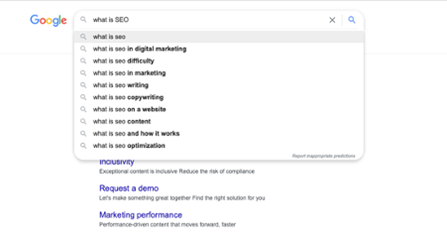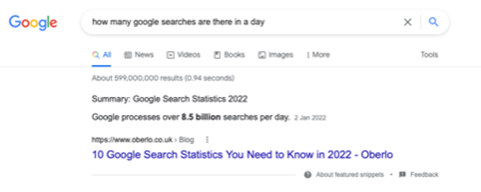The Top 6 ways to Nail Keyword Rankings
12 October 2022
Keyword Ranking – outside of our SEO community, it can feel like a sea of technical jargon. I get it, but it's an essential component of any website succeeding. Ultimately a number 1 Google search result for a given query has an average CTR of 31.7% (and for context, that's good!) and will typically get 10x more clicks than the website at number 10… so you can imagine the websites on page 2-3.
It refers to your page's specific spot on the search results pages for a particular search query. When people type in search terms to Google that relate to your page's subject matter, whichever spot your URL is shown in is your keyword ranking.
For example, I want to understand what SEO is – I type my question into Google and the results that appear when I hit 'enter' are what Google understands as the most likely to suit my needs. This is largely due to their use of those keywords I've typed in across their own website.

Google alone dominates the search engine market, so it is pivotal for any business needing website traffic to consider what Google wants. The more you understand the algorithms and speak to their ranking factors, the more likely you are to get quality traffic to your website. With more than 85% of global traffic and 270 million unique visitors in the US alone, it would be a mistake to ignore this stuff.
Plus, 75% of internet users never go beyond the first page of results… so, I've broken down my Top 6 areas to consider for Keyword Ranking:
As with any business decision, you wouldn't make it without market research or data behind you, right? Informed choices are key in this competitive world, and Keyword Ranking is no different! Use tools like Google Search Console to analyse the keywords that are driving traffic to your website. Without knowing your baseline, you won't be able to know where to go or how to assess success.

Analysing this data will give you a good idea of the following:
This is also where SEO audits come in VERY handy. A technical expert can assess your website, look at the search volume for keywords that relate to your brand, and ensure those are optimised across your website to drive conversions.
When you've done your research, you have data to help you understand what your target audience are searching for – and what keywords they're using – now it's time to ensure they're the RIGHT keywords.
What I mean by that is this, there are over 8 billion Google Searches a day, by no means are all of those going to be relevant to your business, let alone your website. So, let the 35 million people search up elephant videos, and ensure you only rank for keywords that are relevant to your business. For example, if you're an eCommerce business selling dog toys, you don't want to put time and effort into ranking for words like 'quality cat food' or 'best pet shops in my area'. Make sure the keywords you invest time and content in are conversion-rich keywords.
Our advice is to focus on improving keywords that are ranking in positions 5 through 15, these words are usually seeing you appear at the bottom of page 1 or 2 on Google and can therefore see your traffic improve if you get them higher up on those SERPs.
This is a key element for any business, make sure your website performance is where it needs to be. Make sure the structure of the site and landing pages are clear, make sure the path to conversion (whether that be Lead Generation or Ecommerce sales) is simple and quick, and always consider the user experience (UX). A CRO audit can be great to understand these finer details, but ultimately if you work hard to optimise keywords and you gain valuable traffic – don't lose them based on website performance.
Our advice is that both bots and humans want us to:
They say SEO is a marathon and not a sprint, I like to say we're here for a long time, not a good time. Optimising content, keywords and improving your rankings can take time – algorithms change all the time, more competition appears every day, and Google has trust issues. It won't boost your rankings overnight, so take the time to do it right, build into your digital strategy regular reviews, analyse the data coming in and remain agile.
For example, monthly checks of Google Search Console can help you see new search terms sending traffic to your website, and you might notice more 'okay Google' additions. This would help you understand your traffic is using voice search, and you can optimise keywords and content accordingly.
Optimising keywords and content across your website for featured snippet results and rich snippets should be a key part of your SEO strategy / digital strategy.

In this day and age people want immediate satisfaction and immediate answers. These snippets can sometimes give a searcher their answer without even clicking on your website, but it will build domain authority over time and showcase you as the expert they need.
This last point is something I have to really stress. It is almost impossible to rank 1st place across Google. Stay with me here… Earlier I talked about search intent. Google wants to match user intent and it treats EVERY SINGLE SEARCH differently. When any rank tracker is telling you “HEY YOU’RE 1ST FOR THIS KEYWORD”, it is looking solely at that keyword in a search against a specific IP address at that one time.
Now while Google is operating like that, that isn’t how people search. You might start out searching for one thing, reading about it, finding a new keyword (which Google is picking up as related but treats differently). So, my advice to swerve this stuff?
When you rank #1 for a keyword, don’t treat it as being set in stone. Think of it as a barometer for your wider keyword pool (RE: Points 1 & 2) and how improvements in one area can lift others. The more consistent over time with the work – the more success you’ll have.
See you in the SERPs!
There you have it, some key advice on dominating in the SERPs. For more advice or to discuss wider SEO strategies, make sure to get in touch with our award-winning team, here. Loud Mouth Media are a leading SEO Agency in Belfast.